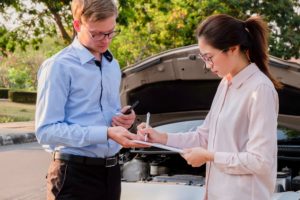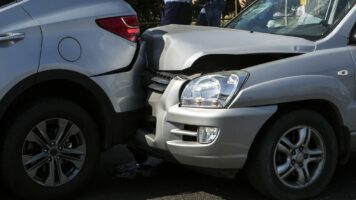You may have plenty of questions if you’re involved in a car accident. One of the most pressing questions most car accident victims have is, “who pays the bills after a car accident?” It is a fair question, considering the money to cover your expenses and reimburse you for your losses has to come from somewhere.
In short, the party responsible for paying bills after a car wreck is the party at-fault for the accident. For this reason, determining fault is one of the most critical parts of a car accident claim.
Once you’ve figured out who is at fault for your accident, you can proceed with your claim and attempt to recover financially for your harm and losses. Reach out to a car accident lawyer.
You Can Hold the Party at Fault for the Collision Financially Responsible
If you didn’t cause your car accident, it is entirely unfair to expect you to shoulder the hefty financial burdens that may follow. For this reason, the party who caused your accident is financially responsible for the harm and damage their actions caused.
Whether only one other party caused your accident or multiple parties may be to blame, deciphering who is at fault is critical to recovery monetarily.
Who Can You Hold At Fault for an Accident?
Every car accident is different, and several parties are often at the center of collision claims. The following are some of the most common at-fault parties in car accident cases.
Another Driver
Drivers have a duty to drive safely and responsibly to keep themselves and others on the road free from harm. However, drivers can be selfish, engaging in dangerous behaviors like distracted driving, aggressive driving, and speeding, which all frequently result in severe accidents.
When another driver is at fault, they must pay. As easy as this sounds, negligent drivers do not reach deep into their pockets and hand you money. In most cases, their insurance companies pay you for your injuries and other financial losses because, after all, that’s what insurance is for.
In some cases, you may also have the opportunity to file suit for additional compensation. This can occur for certain reasons, like the compensation you’re entitled to under their insurance policy is insufficient to cover your accident-related expenses, or the driver does not have insurance.
While a car accident with another regular driver might seem simple to handle, these cases regularly present challenges or take sudden turns for the worst. For this reason, a car accident attorney can help you navigate accident claims and protect your rights to compensation.
A Commercial Driver
Collisions with commercial trucks frequently happen and regularly result in significant damage and injuries. In a recent year alone, 107,000 semi-truck accidents resulted in injuries, and over 4,000 commercial collisions were fatal.
Truck accidents are known to be some of the worst wrecks drivers can ever be involved in. This is because trucks are large and heavy, capable of extensive destruction and substantial injury to victims.
Truck drivers often cause accidents for their irresponsible driving behaviors, including speeding, driving under the influence, or driving while fatigued.
While truck drivers themselves can be solely responsible for trucking collisions, in many truck accident cases, other parties also play parts, including the truck driver’s employer, the party responsible for loading the cargo, or the party in charge of truck maintenance.
Truck accident cases are known to be difficult to handle for many reasons, including determining fault, as many parties can share liability for one accident.
A Company
Different companies and businesses can be responsible for a car accident, especially when a defective product is involved.
In plenty of cases, an individual, like another driver, is not responsible for causing accidents, but the vehicles themselves can cause collisions. For example, if your vehicle had defective brakes that ended up causing you to crash, perhaps the vehicle’s manufacturer or the manufacturer of the brakes can be liable for your accident.
Cases involving defective or malfunctioning products can be tricky to handle, as there are many moving parts and details to prove. An attorney experienced in handling defective product claims can help create a legal strategy to collect from all parties responsible for the defect.
A Governmental Entity
Governmental entities can be liable for accidents in several cases, including when a government vehicle causes an accident. For example, if you’re involved in an accident with a city-run bus, you may need to pursue compensation from the local government.
Additionally, governmental entities can be liable if you’re involved in an accident caused by defective roads. The local government is typically responsible for keeping public areas, like roads, safe for all.
Determining Fault is Key for Collecting Compensation

Establishing fault is also important in fault states. States are either fault or no-fault states regarding traffic accidents and car insurance. In a fault state, the at-fault driver’s insurance must pay for accident-related bills and expenses, so there must be a strong determination of fault.
On the other hand, in a no-fault state, you usually rely on your own insurance to cover your expenses rather than waiting on the other party’s insurance. Fault still exists in these states, nonetheless, because your insurance can pursue reimbursement from the other party’s insurance, but positively establishing fault is not as important at the outset.
Figuring out what caused your accident and who is responsible can be one of the most challenging parts of a car accident claim. Therefore, a car accident attorney’s help is much-needed in many cases, as they are skilled in everything having to do with collision claims, including fault.
Establishing Fault in a Collision Case
Accidents can happen due to intentional conduct, but in a majority of cases, negligence is the main culprit. When a party acts negligently, it means they failed to act in the same manner a similarly-situated party should have.
To establish a party’s negligence, you must prove four elements, which are:
- The other party owed you a duty of care
- The other party’s actions caused them to breach their duty of care
- This breach of duty was the cause of your accident
- You suffered injuries and other losses as a result of your collision
Proving the other party acted negligently provides a strong foundation from which you can continue building your case.
Evidence Plays a Critical Role in Car Accident Claims
It is not simply enough to claim a party was negligent; you must also provide hard proof that their negligent actions caused your car wreck. For this reason, evidence is critical.
The type of evidence your claim might benefit from depends on the details of your case but can include:
- Photos and videos
- Witness statements
- Police reports
- Surveillance and traffic cam footage
- The vehicle’s black box data
- Medical records
You can begin gathering evidence at the scene of the accident, if possible. Nonetheless, a car accident attorney can obtain evidence and documentation to strengthen your claim and help you fight for the financial recovery you deserve.
Ways to Collect Compensation for a Collision
Because every car accident case is unique, how you can collect compensation depends on the details of your case and the way your claim goes.
The following are the common ways car accident victims pursue monetary recovery after a car crash.
The Liable Party’s Insurance Company
Liable parties don’t usually pay for your accident bills out of pocket, mainly because most people don’t have thousands – or millions – of dollars to spend. One of the main reasons insurance is so important is that it can help pay victims in the event of a collision.
If you live in an at-fault state, you’ll likely go directly to the other driver’s insurance company to file a claim for compensation. However, even if you end up filing a lawsuit, the other party’s insurance company may still pay.
In a large number of accident cases, the responsible party’s insurance is left to foot the bill one way or another.
Your Insurance Company
You may need to rely on your insurance and personal injury protection (PIP) to cover your collision-related expenses – specifically, if you live in a no-fault state.
It can be much easier and less time-consuming to go through your own insurance, allowing you to cover your needed expenses faster than relying on the other insurance company.
To get coverage through your own insurance, you’d file a claim directly with them. It’s worth noting that, regardless of whether you file a claim for compensation under your own policy, you still need to notify your insurance company of a car accident.
Uninsured/Underinsured Motorist Coverage
Uninsured or underinsured motorist coverage kicks in under certain circumstances.
Uninsured motorist coverage (UM) can help pay your bills if you’re involved in an accident with a driver that has no car insurance. While it is illegal to drive without car insurance in most states, countless drivers still do it, hoping they’ll never get into an accident or have any issues.
Underinsured motorist coverage (UIM), on the other hand, helps fill in the gaps if the at-fault driver has insurance, but their policy coverage is not enough to cover all of your accident expenses.
Depending on your state, UM/UIM may be mandatory. In others, this type of coverage is only optional.
Medical Payments Coverage
Medical payments coverage, also commonly referred to as med pay, is part of an auto insurance policy. It can help cover you or your passenger(s) for medical bills in case of injuries during a car accident.
When an individual causes a car accident in a state that has med pay, and they don’t have this type of coverage, they’re left to pay for their medical expenses out of pocket.
When the other driver is at fault for a car accident, their insurance policy can help pay your medical bills.
Usually, med pay is optional coverage and is not available in every single state.
Car Accident Lawsuits in Civil Court
Under some circumstances, filing a lawsuit may be necessary to fight for the compensation you deserve for all of your losses.
Usually, a lawsuit is not the first step after a car accident but rather an insurance claim. In certain cases, for example, those where the responsible party doesn’t have insurance or the insurance company refuses to settle your claim, a lawsuit may give you the best chance at obtaining financial recovery.
Taking legal action after a car crash can be stressful, confusing, and overwhelming. Therefore, you should not try to tackle a lawsuit alone. Be sure to consult with a qualified attorney to get valuable advice and legal guidance regarding your situation.
Who Pays When Multiple Parties Are Liable?
If more than one party is at-fault for your accident, the rule usually remains the same, and financial responsibility falls on them.
The only difference is the parties share responsibility, so insurance companies must calculate every party’s respective percentage of the fault, so you receive compensation from respective insurers depending on their involvement.
Your lawyer must investigate your car wreck and closely examine the details to help figure out who is at fault and the extent of their participation in your collision.
A Car Accident Attorney Can Help You Collect Fair Compensation for Your Car Accident Losses

Car Accident Attorney, Phillip J. Barkett
After a car accident, you may feel stuck and unsure of what to do next. You want to seek compensation, but you may wonder how and from who. Fortunately, an experienced car accident lawyer can answer these and many other questions, helping protect your rights and put you in the best possible position to obtain compensation for your losses.
You don’t have to sit and stress about how you will cover your medical bills and other accident-related expenses. Speaking with a personal injury attorney can give you peace of mind regarding your legal rights and options.

